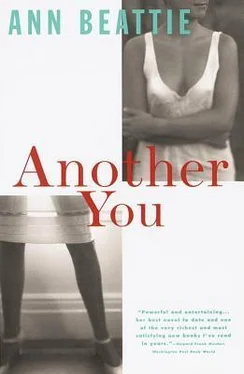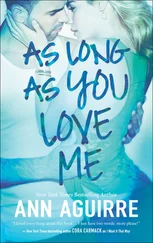Ann Beattie - Another You
Здесь есть возможность читать онлайн «Ann Beattie - Another You» весь текст электронной книги совершенно бесплатно (целиком полную версию без сокращений). В некоторых случаях можно слушать аудио, скачать через торрент в формате fb2 и присутствует краткое содержание. Год выпуска: 2014, Издательство: Vintage Books, Жанр: Современная проза, на английском языке. Описание произведения, (предисловие) а так же отзывы посетителей доступны на портале библиотеки ЛибКат.
- Название:Another You
- Автор:
- Издательство:Vintage Books
- Жанр:
- Год:2014
- ISBN:нет данных
- Рейтинг книги:5 / 5. Голосов: 1
-
Избранное:Добавить в избранное
- Отзывы:
-
Ваша оценка:
- 100
- 1
- 2
- 3
- 4
- 5
Another You: краткое содержание, описание и аннотация
Предлагаем к чтению аннотацию, описание, краткое содержание или предисловие (зависит от того, что написал сам автор книги «Another You»). Если вы не нашли необходимую информацию о книге — напишите в комментариях, мы постараемся отыскать её.
Another You — читать онлайн бесплатно полную книгу (весь текст) целиком
Ниже представлен текст книги, разбитый по страницам. Система сохранения места последней прочитанной страницы, позволяет с удобством читать онлайн бесплатно книгу «Another You», без необходимости каждый раз заново искать на чём Вы остановились. Поставьте закладку, и сможете в любой момент перейти на страницу, на которой закончили чтение.
Интервал:
Закладка:
The one thing Marshall liked about Llewellyn was that he had a big pig of a dog, a rottweiler-black lab mix, he thought it was — that he brought to school with him. Why not send in the dog? It would be just as charming as anything he could muster.
“Yes,” Marshall said. “But in your note to me, when you thought Mrs. Whatever-Her-Name-Is—”
“Mrs. Adam Barrows. She refers to herself that way. Keeps us guessing about her first name, but not about what generation she’s from,” the President said.
“Yes. You thought she was coming at the end of the week. I said—”
“You said you didn’t remember her daughter, but let me tell you, Professor Lockard, that girl remembers you, and as you must realize, our college would be most pleased to have an endowment that would allow us to bring in a visiting poet. No need at all to state what you don’t remember.”
“I’ll pretend that I’m being tortured,” Marshall said. “I’ll just state my name—”
“Good one,” President Llewellyn said. “I was in Korea. You?”
“Flunked the physical during the Vietnam War,” Marshall said. “Mental illness.”
“That aside,” President Llewellyn said. “I can count on you?”
“Sir, where Spanish sherry is poured, I am never far away.”
“We have red wine, too,” President Llewellyn said, sounding more on the offensive than he had when he spoke about serving in Korea.
“Beaujolais?” Marshall asked.
“Good one. Three-thirty, in the Irving T. Peck Room. I appreciate it.”
He hung up.
For a while, Marshall considered taking some poetry books with him, reading aloud from them whenever he could pretend a stanza or so was pertinent, watching the President squirm. To add to the impression of preoccupation and self-absorption, he could wear the black beret Sonja had found — something that had been mysteriously left hanging on the car aerial in the grocery store parking lot, she said. She had thought about putting it on someone else’s aerial, assuming that it must be a lost hat someone had wanted to call attention to, but as she was walking toward the nearest car with an antenna, she realized that a man was sitting inside, watching her. She had pretended to be looking for someone, then quickly returned to her car with the hat still in her hand, feeling as guilty, she had said, as if she’d been caught about to spray graffiti. So: the poetry books; the beret. And perhaps he could bring a bottle of Beaujolais, if there was one in the house. Draw a mustache over his top lip, call her Madame. Such ideas were what Sonja called not funny and also self-defeating . “You’re not one of the college kids,” she often reminded him. “Why do you have to let the nonsense get to you so much?”
Because it was what he did for a living. Because he hadn’t published a book when he should have, which would have been his ticket out of Benson College, and the possibility of a serious academic career. And now it was too late, because all anyone cared about was theory. No one read books and got excited about them anymore; they argued that transparent plots were murkily opaque and incomprehensible, they projected political interpretations onto literature, then decried the offensive political implications. The day before, while he was getting a drink of water, Susan Campbell-Magawa had tucked a pamphlet in his back pocket — hey: what if he cried sexual harassment? — announcing a conference she knew he wouldn’t want to attend: Natty Bumppo and the Postmodern Predicament. Susan Campbell-Magawa and her husband would be renting a Rent-A-Wreck to drive through Southern California in order to go to an air-conditioned conference room in a windowless building, to express outrage, with other academics, concerning the improper politics and convoluted neoconservatism of a fictional character named Natty Bumppo. Mr. Magawa did not live in New Hampshire. He lived in Ann Arbor, where he had a job at the University of Michigan. He and his wife commuted: one weekend a month he would fly to New Hampshire; one weekend she would fly to Michigan. With their frequent-flier miles, they vacationed every summer on Maui, where this year, no doubt, they would continue their discussion of Natty Bumppo while walking the beach with leis around their necks, and eating suckling pig, as Susan Campbell-Magawa continued to try to conceive a child. He knew this because Susan Campbell-Magawa, who had no use for him, was fond of Sonja. They had talked in September, at the welcoming party for new faculty. Mr. Magawa, who applied every year for a job at Benson and who was inevitably rejected because he was overqualified, was not in attendance. One year, he had distinguished himself by fainting while talking to President Llewellyn and later sending a note of apology, saying that his hectic life of commuting had recently begun to cause his physical collapse. Behind Susan Campbell-Magawa’s back, Jack McCallum and Darren Luftquist had worked up howlingly funny imitations of her husband passing out. The idea was to enact this as soon as possible after Susan Campbell-Magawa left the room, to try to make whoever remained in the room laugh, which usually meant that she would return to see if they were laughing at her. Once, Jack McCallum had almost been caught. From the floor, he had pretended to be tying his tennis shoe, and Dr. Gerold Ziller (as he always signed his memos) had appeared peculiarly cruel, to be laughing so hard at a man down on one knee, having trouble tying a shoelace, as Susan Campbell-Magawa reappeared and stood frowning in the doorway.
When Marshall first got the job, he had worked harder and been more collegial. But his real friends had moved on, publishing books that got them better jobs, or dropping out of teaching and going to business school, and as far as he was concerned, the serious study of literature had gone out the window when the theorists marched in. As he got older, the students got younger. Enrollment fell, and more local students began to enroll. Now he routinely taught a course in composition, as well as his poetry seminar and his survey course on modern American literature. He was considered stodgy, but admirable. The newer people taught Third World literature and women’s studies. McCallum taught a seminar on the unreliable narrator in twentieth-century fiction, as well as offering a course in popular fiction, informally known as “shit lit.” Well, he thought: as one student had recently written, “It’s a doggy dog world.” He was a mutt, and the purebreds were at Stanford or Columbia or Harvard. So, he wondered, who else would be at the sherry fest? Dr. Gerold Ziller was only on campus one day a week, on the orders of his proctologist. Susan Campbell-Magawa had probably already left for the City of Angels, to fly among her airheaded own. McCallum. Would they bring out that wild card? Or would it be other people in the department, or people from the administration? Someone from campus parking, perhaps, to explain why Mrs. Adam Barrows had had to park half a mile away, since the mudflat that was once visitor parking had been paved over to provide an area for safer Rollerblading?
At exactly three-thirty, his hands empty of books, his head bare, Marshall walked into the Irving T. Peck Room. Barbara, the voice on the phone, was there, emptying ice cubes into an aluminum ice bucket beneath the portrait of Professor Emeritus Irving T. Peck. In the portrait, Peck’s long neck stretched high, like a chicken or turkey looking for a way out. The folds of skin, relentlessly detailed by the portrait painter, added to the impression of the man as a startled fowl. He had retired the year before Marshall came to Benson, though questions about his sexual preferences still remained, indelibly, in the men’s room.
Barbara greeted him with delight. She was younger than he’d thought from her officious voice on the phone — young and, it turned out, quite pleasant. The President was showing Mrs. Barrows around the library, she told him. He wondered aloud whether Mrs. Barrows would be shown the easily jimmied-open window in the history stacks, through which books could easily be dropped from the second floor. Barbara blushed, as if she had personally arranged the book drop. She emptied the ice cubes into the bucket, shook the ice cube tray over the floor, and dropped the tray in her backpack. She set the sherry bottle in place — there was no red wine — and put out plastic glasses and paper napkins on the mahogany drop-leaf. Today, the table was protected by a series of place mats imprinted with pictures of wolves running along under grapevines or through snowy fields, or leaping in midair, about to pounce on a frightened rabbit. Barbara surveyed everything and announced that she would take her leave, lifting the backpack from the floor, shrugging her shoulders to center it on her back as she inserted her long, thin arms.
Читать дальшеИнтервал:
Закладка:
Похожие книги на «Another You»
Представляем Вашему вниманию похожие книги на «Another You» списком для выбора. Мы отобрали схожую по названию и смыслу литературу в надежде предоставить читателям больше вариантов отыскать новые, интересные, ещё непрочитанные произведения.
Обсуждение, отзывы о книге «Another You» и просто собственные мнения читателей. Оставьте ваши комментарии, напишите, что Вы думаете о произведении, его смысле или главных героях. Укажите что конкретно понравилось, а что нет, и почему Вы так считаете.












